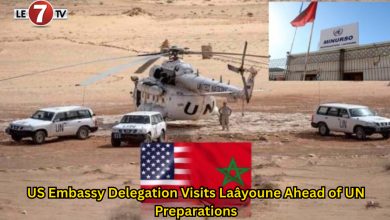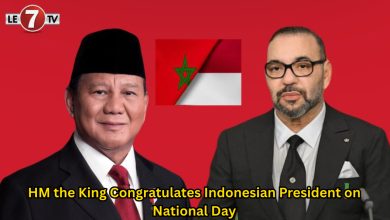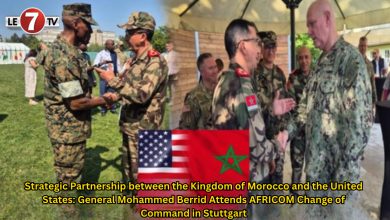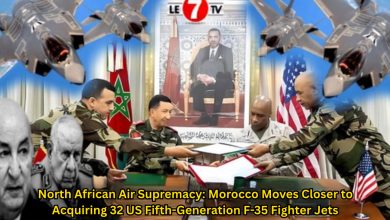The immense waste or the broken dream of the “Greater Maghreb”!
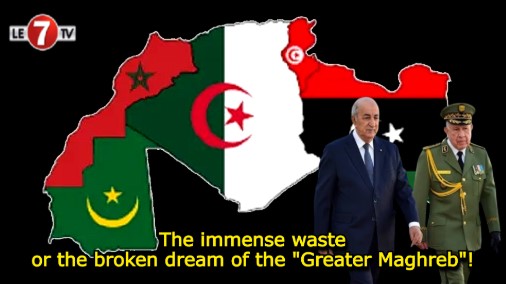
For decades, the idea of a united and prosperous Greater Maghreb has captivated visionaries and advocates of regional integration in North Africa. A geographical area that could have rivaled the world’s most powerful economic blocs thanks to its natural resources, cultural heritage, and immense human potential. Sadly, this dream has been systematically sabotaged by the Algerian military junta, trapped in its archaic ideology and hostile maneuvers.
The daydream of a “Greater Maghreb” for the People:
With its five member countries—Morocco, Algeria, Tunisia, Libya, and Mauritania—the Greater Maghreb represents a population of over 120 million. Economic union in this region could have enabled:
- Optimal exploitation of natural resources: Oil and gas in Algeria and Libya, phosphates in Morocco, and fertile agricultural land in Tunisia and Mauritania.
- An integrated common market: Eliminating customs barriers and boosting intra-Maghreb trade.
- Enhanced economic attractiveness for foreign investment: Driven by political stability and coordinated economic policies.
An “institutionalized” deadlock by the Algerian military junta:
Yet, this ambitious project is derailed by a single entity: the Algerian military junta. By clinging to a policy of systematic hostility toward Morocco, it turns political disputes into insurmountable obstacles to regional cooperation.
The Sahara issue
The Algerian junta spends billions of dollars financing and arming the Polisario separatist group, turning an artificial conflict into the epicenter of its diplomatic relations. Instead of prioritizing negotiation and diplomacy, it blocks any initiative that could foster regional stability, choosing to maintain a paralyzing status quo over integration.
Morocco-Algeria borders fully closed: A historical nonsense
The closure of the land border between Morocco and Algeria since 1994, later extended to air and sea routes, stands as a tragic symbol of this absurd policy of division. This decision, motivated by petty political reasons, deprives both nations of vital economic and human exchanges. Families remain separated, trade flows are non-existent, and both economies are weakened.
A regime obsessed with Morocco
The Algerian military junta, ruling through fear and repression, has turned Algeria into a rentier economy wholly dependent on hydrocarbons. Instead of diversifying the economy or participating in regional initiatives, it diverts resources to maintain an oppressive security apparatus and wage sterile diplomatic wars against Morocco.
Is the “Greater Maghreb” a threat to the junta?
Why does the military junta oppose the Greater Maghreb? Because regional integration would mean:
- Economic openness: Exposing the inefficiency of the Algerian regime compared to dynamic economies like Morocco’s.
- Exchange of ideas and values: Destabilizing a regime built on propaganda and totalitarian control.
- A united regional force: Challenging the Algerian military’s monopoly on political and economic decisions.
The price of inaction
The paralysis of the Greater Maghreb not only harms the region’s people but also the African continent and the world. A strong Maghreb union could play a major role in stabilizing North Africa and the Sahel, regions crucial in the fight against terrorism and irregular migration.
Moreover, the lost economic opportunities are colossal. While Morocco asserts itself as a continental leader through strategic partnerships in sub-Saharan Africa, Algeria, under its junta’s rule, remains isolated and unable to maximize its energy and economic potential.
A call to action
It is time for the peoples of the Maghreb to reject this division imposed by an exhausted military regime. Algerian leaders must realize that their confrontational strategy is not only obsolete but also contrary to the aspirations of future generations.
A united Greater Maghreb is not only possible but essential. Its realization now depends on the ability of Maghreb nations to overcome the barriers erected by a military junta that sacrifices its people’s interests on the altar of hegemonic ambitions.
History will judge
History will judge the Algerian military junta harshly for its role in sabotaging the Greater Maghreb. The potential of this union is immense, yet it remains stifled by a militaro-political elite incapable of seeing beyond its immediate interests. Morocco, for its part, remains committed to regional integration and continues to promote the values of cooperation, solidarity, and shared prosperity. The ball is now in the Algerian people’s court, who will one day have to choose between the isolation imposed by their leaders and the bright future offered by the Greater Maghreb.
Abderrazzak Boussaid / Le7tv


